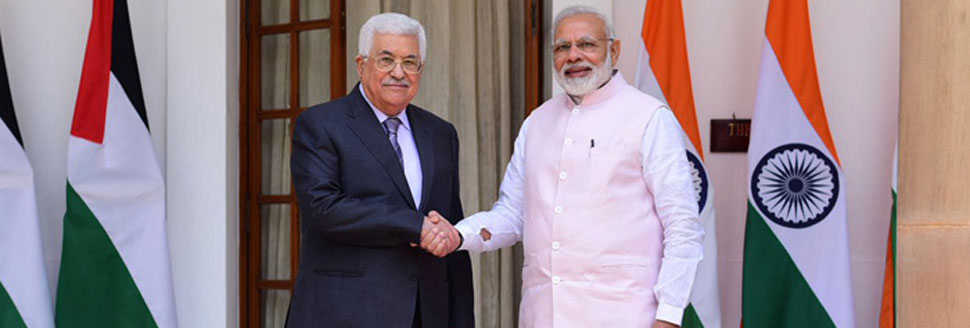PM Modi’s visits Palestine
February 11, 2018 | Expert Insights

Indian Prime Minister Narendra Modi has become the first PM from the nation to visit Palestine while still in office. The hugely symbolic visit comes at a period when there are increased concerns that India’s support for Palestine would waver due to its increased ties with Israel.
Background
India moved to recognize the state of Palestine almost immediately after its independence from the British in 1947. At the time, India provided its unwavering support to the Palestinian cause. This, however, began to falter in the 80s after India established ties with Israel. The two countries have not enjoyed a close relationship in terms of strategic cooperation or trade. The government of India has continued to support the legitimate right of the Palestinian people to a State and the consequent imperative need for a just, comprehensive and lasting peace in the region. An Indian Prime Minister has never made an official visit to Palestine. PLO President Yasser Arafat visited India in 1997. India has continued to provide development and economic aid to Palestine. In the past few years there have been a number of bilateral visits.
In the recent years, India has solidified its ties to Israel. After maintaining a diplomatic distance for many decades, the two countries have established military, trade and cultural ties. Indian Prime Minister Narendra Modi became the first Indian PM to make an official visit to Israel in 2017. In a joint op-ed published in Times of India by both leaders of the state, both Netyanhu and Modi have said, “India and Israel are walking hand in hand into the future as partners. India is a growing economic powerhouse with a large market and talent pool. Israel is a world leader in high technology and innovation.”
A little less than a year later, Israeli Prime Minister Benjamin Netanyahu visited India on a four-day visit. India is the largest buyer of military equipment from Israel and Israel is India’s second largest defence supplier. Between 2012 and 2016, India bought 41% of Israel’s arms export. In April 2017, India and Israel signed a $2 billion missile agreement. India’s increased proximity to Israel has resulted in some concern in the Palestinian camp that India’s support is wavering.

Analysis
Indian Prime Minister Narendra Modi has made history by becoming the first PM of India to make an official visit to Palestine. The short but hugely symbolic visit commenced on February 9th, 2018. Palestine is the first leg of his trip that includes official visits to UAE, and Oman as well. This will be his fifth visit to the west Asian region since 2015.
After having arrived at Jordan, PM Modi first visited Yasser Arafat memorial in Ramallah to pay tributes to the late President. "This is a historic visit that will lead to stronger bilateral cooperation," Tweeted the Prime Minister shortly after he landed in the country. He is expected to hold discussions with Palestinian President Mahmoud Abbas.
The focus of the PM's visit would be to provide infrastructure and facilities that are not available to the people of Palestine," a foreign ministry official told NDTV. To that effect, he will be announcing that a new super specialty hospital will be set up in Palestine with Indian support.
One of the key reasons for the visit is to expand India’s new policy when it comes to Palestine and Israel. The nation hopes to pursue independent “de-hyphenated” relations with both nations without having to take sides during conflict.
"We have de-hyphenated our relations with Palestine and Israel and now we see them both as mutually independent and exclusive and as part of this policy the prime minister is undertaking this visit," B. Bala Bhaskar, joint secretary in the foreign ministry, said.
The Indian Prime Minister is expected to sign five agreements that hope to improve the conditions in Palestine through developments in infrastructure and employment generation. It will also be an indication that India continues to support the Palestinian claim for a statehood and will aid in its nation building. India will also be helping in the building of Palestinian Institute of Diplomacy.
Assessment
Our assessment is that with this visit, India hopes to increase its influence in the region and establish its policy of pursuing independent and de-hyphenated ties with both Israel and Palestine. However, Jerusalem may prove to a thorn in India’s goals. India was among the majority of nations across the world that condemned US President Donald Trump’s recognition of Jerusalem as Israel’s capital. This was not well received in Tel Aviv. Israeli Prime Minister Netanyahu during his recent visit remained diplomatic about the UN vote but expressed hope that India would support Israel’s claim. We believe that pursuing a de-hyphenated relationship will be most conducive in the present circumstances.








Comments